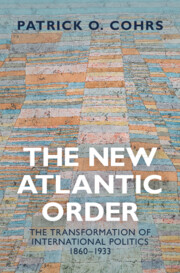Book contents
- The New Atlantic Order
- The New Atlantic Order
- Copyright page
- Dedication
- Contents
- Acknowledgements
- Abbreviations
- Maps
- Introduction
- Part I Inevitable Descent into the Abyss?
- Part II The Greatest War – and No Peace without Victory
- Part III Reorientations and Incipient Learning Processes
- Part IV No Pax Atlantica
- 14 An Impossible Peace?
- 15 Novel Superstructure of a New Atlantic Order?
- 16 No Just Peace without Security
- 17 The Eastern Frontiers – and Limits – of the New Order
- 18 A Formative Threat?
- 19 The Political and Moral Stakes of Reparations
- 20 The Imposed Peace
- 21 The Truncated Atlantic Peace Order of 1919
- Epilogue The Political Consequences of the Peace
- Bibliography
- Index
15 - Novel Superstructure of a New Atlantic Order?
The Struggle to Found the League of Nations and the Limitations of the Covenant of 1919
from Part IV - No Pax Atlantica
Published online by Cambridge University Press: 22 April 2022
- The New Atlantic Order
- The New Atlantic Order
- Copyright page
- Dedication
- Contents
- Acknowledgements
- Abbreviations
- Maps
- Introduction
- Part I Inevitable Descent into the Abyss?
- Part II The Greatest War – and No Peace without Victory
- Part III Reorientations and Incipient Learning Processes
- Part IV No Pax Atlantica
- 14 An Impossible Peace?
- 15 Novel Superstructure of a New Atlantic Order?
- 16 No Just Peace without Security
- 17 The Eastern Frontiers – and Limits – of the New Order
- 18 A Formative Threat?
- 19 The Political and Moral Stakes of Reparations
- 20 The Imposed Peace
- 21 The Truncated Atlantic Peace Order of 1919
- Epilogue The Political Consequences of the Peace
- Bibliography
- Index
Summary
Chapter 15 offers new perspectives on the formative struggle to establish the League of Nations as an effective international organisation at the heart of the postwar order. It argues that in spite of the global conceptions they advanced its key architects intended the League to become the superstructure of a new transatlantic international order and security architecture. It analyses how far it was possible to find common ground between the most influential American and British blueprints for an integrative League and the markedly different French plans for an institution of the victors whose main purpose was supposed to be to protect France and constrain Germany. And it illuminates why ultimately the League of Nations came to be founded as a truncated organisation dominated by the principal victors of the Great War and initially excluding the vanquished, which were required to undergo a period of probation to become eligible for membership. Finally, it explains the far-reaching consequences this had and examines how far the League nonetheless had the potential to become the essential framework of a modern Atlantic and global order over time.
Keywords
- Type
- Chapter
- Information
- The New Atlantic OrderThe Transformation of International Politics, 1860–1933, pp. 596 - 649Publisher: Cambridge University PressPrint publication year: 2022

